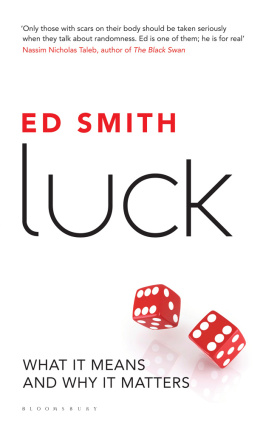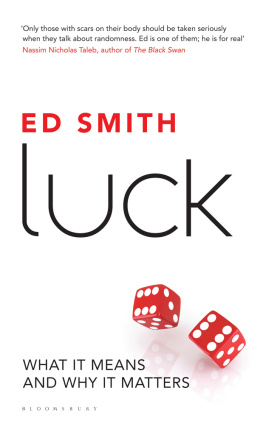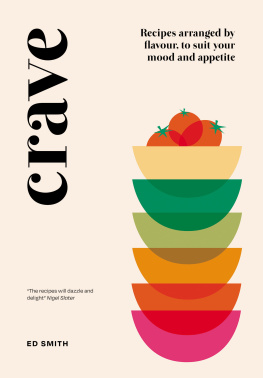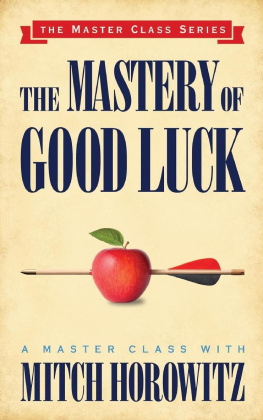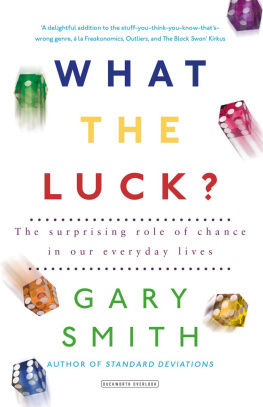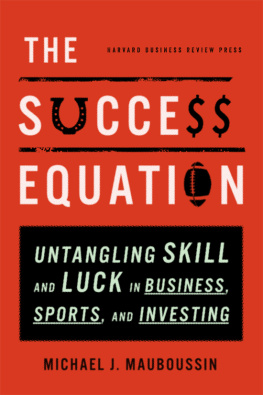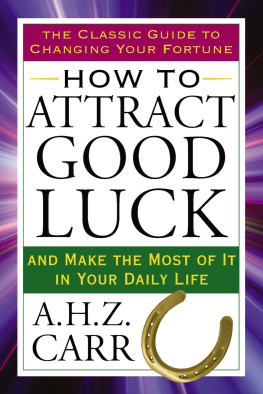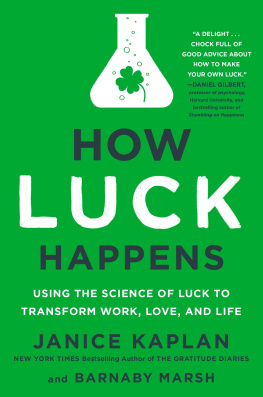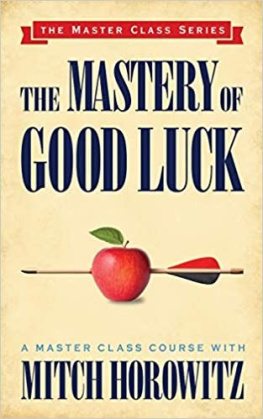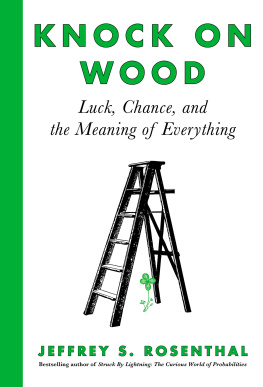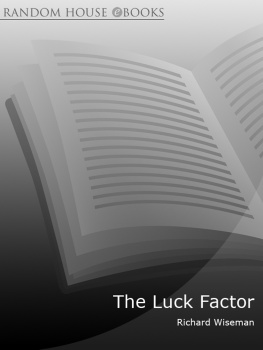I am very grateful to:
Dr John Adamson, Simon Barnes, Professor Andrew Berry, Michael Binyon, Dr Woody Brock, Nigel Clarke, Dr Tony Collins, Cutler Cook, David and Tink Davis, Matt Drew, Professor William James Earle, Andrew Gaines, Ed Gorman, Gideon Haigh, Professor Richard Holt, Dr James Laidlaw, Dominic Lawson, Mark Lawson, Bronwen Maddox, Professor Ian Martin, Adrian Michaels, Colin Montgomorie, Matthew Parris, Neil Pearson, Farris Salah, Dr Anthony Seldon, Vikram Seth, Professor Brendan Simms, Mark Skipworth, Dr Adrian Smith, Professor Stefan Szymanski, Professor Nassim Nicholas Taleb, Professor Robert Travers, Erica Wagner, Professor James Watson, Richard Woolhouse.
Steve Darlow kindly introduced me to Bill Green, whose memory and energy were inspiring.
Matt Denhart provided invaluable help in compiling and collating the statistics about past and present England internationals.
This book grew partly out of a series of conversations over many years with Dr Woody Brock. He introduced me to Professor Kenneth J. Arrow and Professor Mordecai Kurz, who were both very generous with their time when I visited them at Stanford University. It would take another book to do justice to those conversations.
I was very fortunate to be given such a warm welcome to The Times by James Harding, Keith Blackmore, Roger Alton and Emma Tucker. I also learnt a great deal from The Times leader writers: Daniel Finkelstein, Philip Collins, Camilla Cavendish, Joe Joseph, Oliver Kamm, Hugo Rifkind and Philip Howard, who kindly put me in touch with Peter Jones. Matthew Syed generously shared his research about British Olympians.
Several people read parts or all of the manuscript, making extremely helpful corrections and recommendations: Professor John Kay, Martin Trew, Matt Ridley, Dr John Taylor, Jonathan Smith, Becky Quintavalle, John Blundell and Rebecca Smith.
I am deeply indebted to my agent David Godwin, who was a brilliant, generous and wise presence throughout. It was partly a chance conversation with my colleague Ben Macintyre that led me to be published by Bloomsbury. Michael Fishwick instantly understood and expertly steered the book. Working with Nigel Newton, Richard Charkin, Anna Simpson, Henry Jeffreys, Tess Viljoen and Anya Rosenberg couldnt have been more fun. Real luck.
Ed Smith is an author and journalist, and a former international cricketer who represented England, Cambridge University, Kent and Middlesex, where he was captain for two seasons. Ed Smiths previous books include Playing Hard Ball , On and Off the Field the Wisden Book of the Year and shortlisted for the William Hill Sports Book of the Year and the critically acclaimed What Sport Tells Us About Life . After retiring from cricket Ed Smith became a leader writer for The Times . He is now a Times features writer, GQ columnist and writes for the Spectator . He appears regularly on the Today Programme and in 2010 he wrote and presented his first TV documentary for BBC1. Ed Smith lives in London.
Playing Hardball
On and Off the Field
What Sport Tells Us About Life
I
I am the least likely person to be writing a book about luck. For most of my life, I havent believed in it at all. I thought that talking about luck was an admission of weakness. I confidently or naively believed that you made your own luck. If you were good enough for long enough, you got what you deserved. I bridled at the suggestion that We all need some luck. Luck was for other people.
Most kids cheer for the talented showman Ian Botham, Paul Gascoigne or Daley Thompson. Not me. My childhood hero was an obdurate, balding man who wore glasses when he played sport: the tough, flinty Yorkshireman Geoff Boycott.
Why Boycott? Sure, Boycott was brilliant. And I may have picked up a touch of my Yorkshire grandfathers county pride. But it was something else that led me to Boycott. Even as a child, I sensed there was something in Boycott that was different an application of willpower, an elimination of error, an unbendingness and relentlessness. I think all those traits appealed deeply to my over-developed sense of rationality and ambition. Could a child possibly sense in a hero something of himself? It sounds silly, doesnt it? But I think it is true.
It is almost inevitable that future professional cricketers were first mad-keen youngsters. But very few, I expect, stood in front of the television as a four-year-old, front forearm wrapped in a white paper bag to replicate the Boycott armguard, trying to emulate the great masters forward defence: implacable, controlled, defiant, solitary. Not a very jolly form of hero-worship, is it?
But this is exactly how I spent long stretches of childhood. I created an alternative world and inhabited it. Central to my life as a child was creating an imaginary world, a cricketing fantasy in which I always succeeded. Alone in the TV room, Test match on, bat in hand, opponents clear in my mind, technique honed, strategy decided upon. Hours, days, summers all passed with me absorbed in that world. It used to amuse me much later, in the grown-up world when sports psychologists told me to practise positive visualization. Id been at it since I was four.
Batting easily lends itself to metaphor: the innings of a lifetime. How should we bat, how should we live? Boycott stood firmly at one end of the spectrum, taking self-absorption to the limits of sanity. Eyes always on the ball, but only on the ball, never straying to consider the view of the boundary, still less the world beyond it. The Boycott mantra was to retain control, eliminate risk and dictate your own destiny. Even now, Boycott is fond of reminiscing about his contempt for the idea of luck. Dennis Amiss used to say, Good luck to me. I used to reply, Its not luck but ability that counts.
No wonder the phrase Leave nothing to chance is a favourite of modern sports psychologists. They make a virtue not only of the Boycott mindset but also of the Boycott worldview. Ours is the age of ultra-specialization, of eliminating unnecessary distractions, of focusing in and narrowing down. As Boycott himself put it, I loved batting and I do not use the word lightly... everything else had to come second.
I was like that, too: obsessive, relentless and analytical. My bedroom walls were decorated with a series of posters from the MCC coaching manual. The last thing I saw at night as I closed my eyes to go to sleep was a poster entitled, How to play the perfect forward defence. That nerdy streak coexisted with the sociability of the natural show-off. My dad was a brilliant teacher in many respects, but even he couldnt teach me much modesty. It makes me laugh, thinking about it now, to reflect on the contrast between the two of us: the modest father, who would rather do anything than boast, and the immodest son, never happier than when he was recounting recent triumphs.
So when I started playing competitive matches as an eight-year-old, Dad didnt only coach me how to bat, he also coached me about modesty. He had more success in the first than the second.
One day, when we were watching a Kent match together, Dad saw his friend Sir (as he was then) Colin Cowdrey walking towards us. Dad grasped the probability that his cricket-mad son would launch into a long monologue about his own talent as soon as the great man arrived. Now listen, Ed, Dad began. Were about to bump into Colin Cowdrey, one of the greatest players England has ever produced. As he is very polite, he will probably ask about your cricket. Try to be modest. So if he says, Are you a batter or a bowler? you might say, Oh, a little bit of both or something like that. Downplay things. Remember: modesty.
I nodded as if to say, Message received. No problem.
Colin duly arrived and, with his customary charm, immediately enquired about my cricket. Exactly as Dad had predicted, Colin wondered if I was more of a batter or a bowler. Its hard to say, I replied. Dad looked hopeful. I think he began to mouth the words A-little-bit-of-both, trying to prod me in the right direction.
Next page
